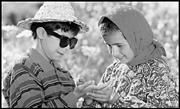IRAN IS HOT, cinematically speaking, and the critical lexicon has become clogged with names like Abbas Kiarostami, Mohsen Makhmalbaf, Jafar Panahi, Dariush Mehrjui, and Majid Majidi, whose The Color of Paradise bears comparison to Makhmalbaf’s The Silence, which played here three weeks ago. Both concern the hardships of an adorable young blind boy, but the differences between the two films provide some clues about the directors. Where Makhmalbaf, an avant-garde figure in postrevolutionary Iran, could be compared to Godard (uh-oh), Majidi tips toward the Spielberg end of the spectrum, which signals both the heart-wrenching appeal and sentimentalism of Color‘s enormously affecting story.
THE COLOR OF PARADISE
written and directed by Majid Majidi
with Mohsen Ramezani, Hossein Mahjub, and Salameh Feizi
opens April 21 at Seven Gables
At his Tehran school, 8-year-old Mohammad (Mohsen Ramezani) waits for his father to retrieve him for a three-month vacation. We know he’s a bright, avid student. He and his classmates punch Braille lessons into paper like woodpeckers; then Mohammad eagerly reads the verse from raised dimples casting shadows across the page. Majidi constantly emphasizes the boy’s hands—they are his means of seeing the world and the windows to his soul.
But Mohammad’s soul is both woeful and remarkably sensitive. In one amazing sequence, he hears a cat stalking a chick fallen from its nest and rushes to its rescue. Yet as his poor widowed father reluctantly returns him to their rural home, it becomes clear that Mohammad is also a somewhat unloved and resented burden. God is “both seen and unseen,” we hear, but Color explicitly asks whether an invisible God is accessible to this boy—much less watching over him.
The journey back to their idyllic village is an explosion of color; Mohammad is joyously reunited with his two sisters and beloved grandmother (Salameh Feizi). Hand in hand, the three kids rush through fields of flowers. The gorgeous countryside, like the peasant women’s costumes, powerfully reminds us of the abundant natural beauty Mohammad perceives—by touch, hearing, and imagination—with such acuity.
NO MONSTER, Mohammad’s father slaves away making charcoal, hoping only to remarry after five years as a widower. He’s wretched, tortured, something of a clown, and a bit like another father in the Old Testament—prepared to sacrifice his son for the promise of a new wife. Covered with grime and soot, Hossein Mahjub harrowingly portrays the anguish of a parent who wonders if his disabled child isn’t a curse. “What have I done wrong to be stuck caring for a blind kid for the rest of his life?” he shrieks at Mohammad’s grandmother, who rebukes his mistreatment of the boy.
It’s melodrama, but of such a simple, elemental style as to recall the silent movie era—when suffering and relief from suffering were enough to hold your interest. Mohammad’s cuteness and pathos make him like a figure out of D.W. Griffith or Dickens. His puckered smile enchants; his halting, uneven gait memorably gives way to a run when he reaches a familiar path through a lush green field. He constantly counts and spells Braille patterns from the natural world. “These hands say they can learn many things,” a kindly carpenter encourages him.
Mohammad’s doleful reply will undoubtedly wet a few eyes, as obviously intended by Majidi, an Oscar nominee for 1997’s Children of Heaven. “You know nobody loves me,” the boy sobs. “They all run away from me because I’m blind.” So where is his God, where is his protector? Those are the questions Color asks while nearing its conclusion, as Mohammad’s father is pushed to the brink of crisis and past. Majidi offers a very different resolution than that of Makhmalbaf’s more astringent The Silence, but one unforgettably powerful in its final dispensation of two lost souls.









